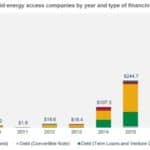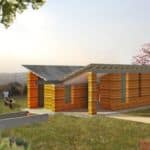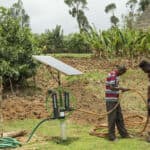Refrigeration Off the Grid: An Innovative Solution to Food Spoilage for the Billions Without Electricity
There is a machine that toils away – day and night – taken mostly for granted in many, if not all, of the kitchens of those reading this article. That machine is, of course, the refrigerator. And many who use it underestimate its true importance: Yes, having access to a refrigerator saves money by allowing you to keep leftovers for another meal. But the ability to store fresh food also allows you the latitude to plan meals ahead, and to be flexible about when you want to go shopping. Ultimately, it gives you the freedom to plan your eating around your life – and not the other way around.
However, over 1 billion people on the planet do not have this luxury. The “2018 State of the Global Off-Grid Appliance Report” estimates that 1.28 billion people lack access to any electricity, and an additional 1 billion have access only to an unreliable grid. This lack of refrigeration leads to the exact problems one might expect: wasted food (and money) from spoilage, and loss of income from long hours spent going to and from the market to buy food that can only be kept for a few days at a time. This not only represents a huge personal cost, but a large environmental cost as well. The UN FAO reports that global food spoilage releases over 3.3 billion metric tons of greenhouse gases into the atmosphere each year. To put that into perspective, after the U.S. and China, rotting food is actually the third largest contributor to greenhouse gases worldwide.
A Need for Better Refrigeration Solutions
Unfortunately, there has not really been a great solution for preserving food for long periods of time for those living off-grid. Traditional refrigerators, which have achieved ubiquity in kitchens across the developed world, are expensive, bulky and require electricity to use, making them a non-starter for many rural households. Ice chests can be used to preserve food, but obviously (and unfortunately), they are dependent on ice. Once the ice inevitably melts after a few days, users are out of luck. As for solar powered refrigerators, while these can be used off-grid, they are prohibitively expensive to acquire. Smaller 60 liter units can cost upwards of $1,500, including solar panel and installation costs.
With the world’s population set to reach 9 billion by 2050, there is clearly a need for better solutions. That’s why my technology company – Fenik – has developed a new invention which we hope can help at least some of the many people currently living without refrigeration. Named the “Fenik Yuma 60L Cooler,” our device uses a phenomenon called evaporative cooling to chill the unit, thereby tripling or quadrupling the shelf-life of the produce stored inside. It was inspired by a traditional Nigerian invention called the Zeer Pot fridge – an earthenware pot used in rural areas for the last few decades, which has been found to successfully enhance the shelf-life of fruits and vegetables stored inside. However, the Fenik Cooler, rather than being constructed out of clay and sand, is constructed with modern materials, creating an evaporative cooler that is ultimately more effective, durable and easier to transport.
Bringing the Innovation to Market
After testing different versions of our device in Morocco for the last three years, iterating on different prototypes and piloting in three different areas in the country, I am excited to say that we have completed the final version of our device. As of two months ago, we are currently in mass production with a unit that is ready to be sold and distributed.
So far, the results of our field tests have been positive. Not only is our Fenik Cooler easier to use than traditional Zeer Pot devices, it has allowed our beneficiaries to save an estimated 10 percent of their weekly income from reduced spoilage. Additionally, our users report that they take fewer trips to the market each week, saving them time and money.
In terms of specifics, our Fenik Yuma 60L has 60 liters of food storage capacity and a water storage capacity of about 4 liters. Our patent pending PhaseTek™ membrane allows the walls of the unit to hold in water while allowing water vapor to permeate outwards. When the water evaporates, heat energy is drawn from the interior of the device, cooling it down by up to 20 degrees Celsius from ambient conditions, and even more in arid environments. It weighs just 3 kg (6.6 pounds) when empty, and is constructed so that it can flat pack for easy shipping.
Certainly, our Fenik Cooler is not a perfect solution for all areas. As an evaporative cooler, it is dependent on ambient conditions and will generally be ineffective in humid climates. Furthermore, it will never get as cold as a traditional refrigerator, making it a poor choice for storing things like raw meat or vaccines. However, since much of the world has no viable alternative, and considering that traditional devices like Zeer Pots have established the value of alternative refrigeration techniques, we hope our invention will go a long way toward helping those who live without a conventional refrigerator.
For more details, please see www.fenik.io. And for those interested in acquiring one for testing, they can be reserved here.
Quang Truong is the CEO and co-founder of Fenik.
Image provided by Fenik.
- Categories
- Energy, Social Enterprise, Technology



